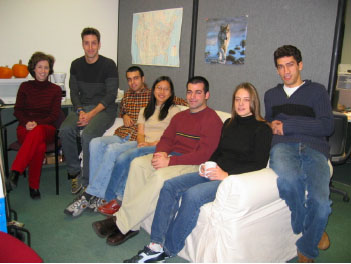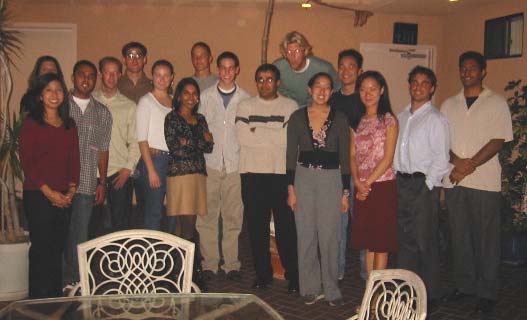


 |  |  | Early and mid career mentoring |
| Co-chairs | Jia Li and Sheila Hemami |
| Panel | D. Richard Brown, Assistant Professor, |
| Worcester Polytechnic Institute | |
| Lydia Sohn, Assitant Professor, UC Berkeley | |
| Rebecca Willett, Graduate Student, U. Wisconsin/Rice | |
| Sheila Hemami, Associate Professor, Cornell Univ. | |
| Yoonkyung Lee, Assistant Professor, Ohio State | |
The previous chapter was largely directed at the mentors and potential mentors. Attention now passes to the mentees. How do you find a mentor? What should you look for? How do you evaluate the success of the relationship and how do you maximize your chances of continued productive exchanges? These generic questions echo those in all human relationships, but here the issues are specific to graduate students interested in an academic career, freshly minted PhDs begining an academic career, and mid-career faculty who may feel serious sea changes with the acquisition of tenure. For graduate students, the interaction with their thesis advisers profoundly affects their motivation to pursue research and the extent they can grow as a beginning researcher. Good mentors can bring substantial advantages to junior faculty members as well. Training in the graduate school mostly focuses on producing independent researchers. A junior professor, however, requires a variety of skills to develop a successful career in academia, including teaching, committee work, professional service, and finding research funding. Mentoring during tenure-track years is highly valuable for a junior professor to master skills in these areas. In this chapter we consider the progression of finding mentors, benefiting from mentors, and in maintaining momentum after tenure.
It is easy to put together a list of ideal qualities for an adviser. Among the attributes that come to mind are the following.

|
Finding a mentor should begin with a little homework, beginning with some self appraisal. What are your objectives in graduate school? What type of training do you desire? What are your strengths? What skills do you need to develop? What kinds of research or creative projects do you want to work on? What type of career do you want to pursue? You may not know the answers to all of these questions, but you should give them some thought. They may arise in conversations with peers and potential mentors.
Explore the available research groups in areas that interest you on the Web and in discussions with other students. Go to general seminars where professors and students discuss their work. Take courses from the candidates, especially project courses where you get the opportunity to do initial research and get to know the professor and senior graduate students. Eventually you need to chat with them about doing some research with their group, but it is an enormous help if you already know them when you do this. If you have taken a course from them and done well, it gives you an extra boost. Sometimes you can sign up for a directed reading or individual research course, where you can negotiate with the professor for a custom project. Some professors will want candidate group members to tackle a well defined problem that they provide, others prefer to point a student to a general area and the literature and let them propose a problem.

|

Funding is often an undercurrent in these discussions, some professors have more funding than others and have larger groups, but all are very careful about committing the precious research assistantships they might control. Rarely will they be available for new students, usually students have to work their way up the ladder. Be prepared to discuss your funding or lack thereof. If you really like an underfunded professor, you may have to seek alternative funding to work with the professor-- things like teaching assistantships, industrial support, consulting, or possibly an assistantship for another professor as a computer/network administrator.
There is no one-size-fits-all solution, and finding a research supervisor, like finding a research project, is a substantial part of the PhD. It usually requires as much creativity, imagination, persistence, and hard work as does the research itself.
And then there is the negative side. You will often get advice, solicited or not, about which potential advisers to avoid. Opinions were voiced against the following character types:
Chapter * and the following URLs provide resources for finding and profiting from mentors:
Some schools have organized programs for mentoring new faculty, sometimes forming teams based on preferences. Investigate to see if you have such resources available to you. Some departments assign mentors for new faculty, and that gives you someone to talk to and it may be enough. Often, however, it is not sufficient and you may need to seek additional council, possibly even from other institutions. It is particularly important at this stage to find someone with a reputation for both strong teaching and strong research and for a good balance between the two. Unfortunately deans and chairs are not always suitable for this role because they are less active in both teaching and research because of their administrative duties. Two attributes often mentioned for good mentors are that they should have a good sense of humor and that they should be pragmatic.
Probably the best strategy for finding a primary or secondary mentor is to chat with many possible candidates and pursue conversations with people with whom you feel comfortable. Take advantage of any connections you might have, for example local friends of your PhD supervisor or other professors you know and like. It is best to look for someone who is tenured, because learning about the tenure process early can make it far less scary. Every institution operates differently, but all have similar criteria for excellence in research, teaching, and professional service. Finding good advice for allocating your time can be very helpful.
In addition to addressing the skills needed to survive and prosper in academia already mentioned as reasons for seeking a mentor, there follow many other helpful influences a mentor can have on a new faculty member.
These advantages only accrue if you maintain regular contact with your mentor, and regular lunches or walks or coffee provide a good opportunity for doing so.
Mentors at other institutions are less helpful in dealing with the home institution, but they can be a big help in many other aspects of your career. They can provide independent advice on your grant applications and an outside objective perspective on your career advancement. Sometimes they can find out useful information through their own informal networks. They can also nominate you for editorial and program committee service that can provide an excellent means of expanding your knowledge of the field and its members.
The right of passage of tenure effects all major aspects of academic life: research, teaching, service, sabbatical leaves, and the other part of your life (you have one, don't you?). The impact on research is the easiest to predict. Presumably you are doing it because you like it, so momentum on research is usually easy to maintain. Often, however, people consider sabbaticals at about this time to consider new research directions, perhaps far from the PhD work. Paulette Clancy, Chemical Engineering Chair at Cornell, said "I ...had no problem maintaining research momentum ...because research is the single most appealing task of my day."
Teaching momentum is also easy to maintain if you're excited about what you're doing. It is a good time to consider designing a new class or redesigning the same-old-class that your department has been teaching for the last 50 years. Be proactive about your teaching assignments and you will enjoy it more. A good balance is to be involved both in advanced courses for recruiting graduate students and core courses for bringing new undergraduates into the field.
Expect major changes in the service aspect, however, these are likely to rise significantly. Junior faculty are often protected from major committee assignments, like the committees that handle admissions, appointments and promotions, and the academic program. Now that you are famous and tenured, you may also find invitations for major editorial positions in technical journals, chairing conference technical committees and the conferences themselves, and possibly government agency advisery committees and panels. Be proactive, not reactive: identify areas in which you want to contribute and notify the authorities. Take a leadership course if your university offers it.
So what about the sabbatical? Common suggestions are to write proposals in a new area or go elsewhere and learn something new, meet new people, do cool things. This requires careful planning, but can inject a major boost in your career. Another alternative is just to hide out, work on your on research and writing with your graduate students, and hopefully return well rested and ready to go.
Be aware that if you have a family, they may have expectations about a lightened workload after tenure. Think about rebalancing your life commitments with academic progress. Does your kid/dog/plant still recognize you?
This is perhaps a good time to ask yourself if your are happy at what you are doing and adjust accordingly, but please don't retire on the job.
 |  |  | Early and mid career mentoring |